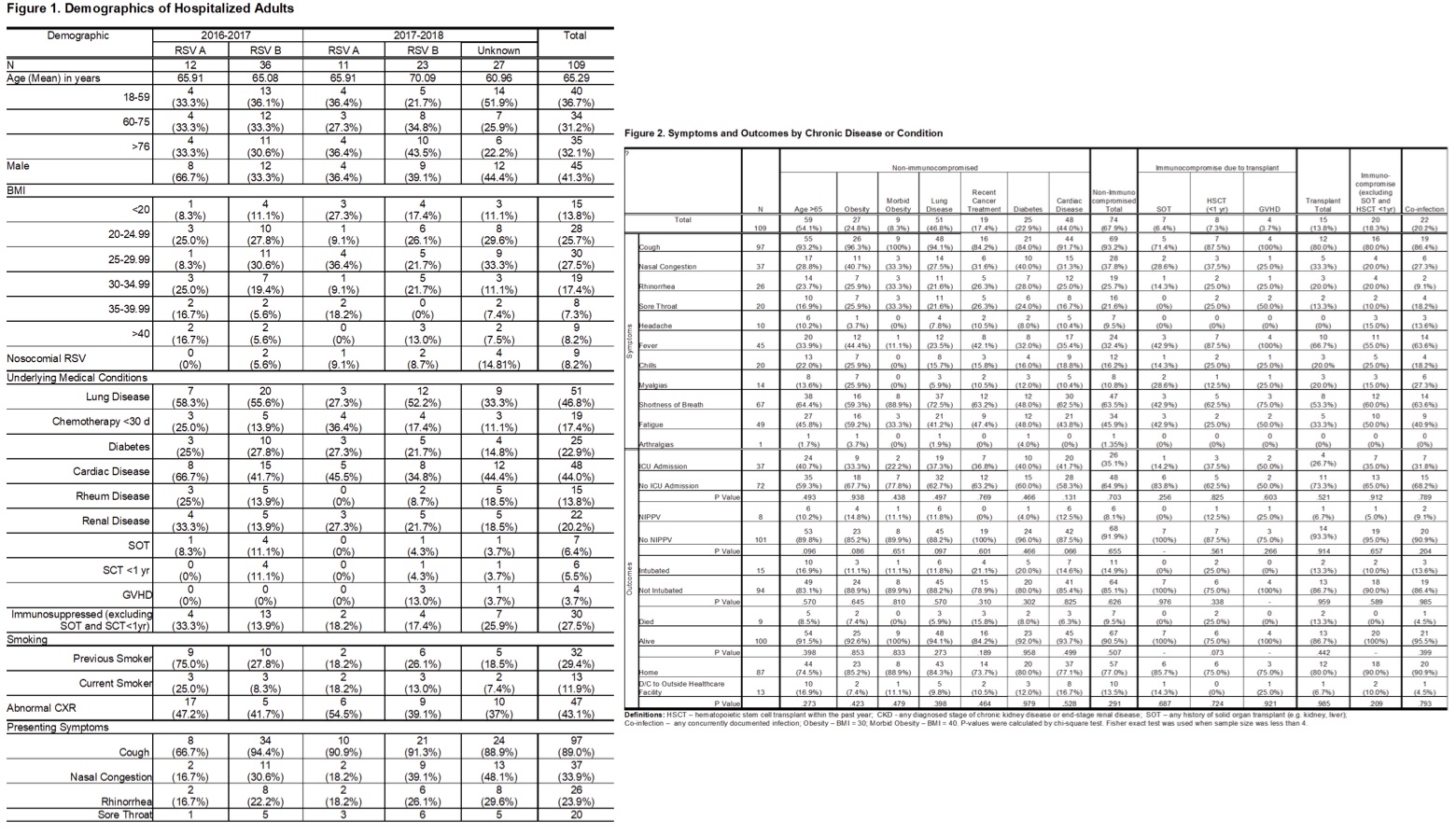Burden of Respiratory Syncytial Disease among Hospitalized Immunocompromised Adults
H. Nam, M. Ison
Northwestern University Comprehensive Transplant Center, Chicago, IL
Meeting: 2019 American Transplant Congress
Abstract number: 176
Keywords: Efficacy, Infection, Pneumonia, Viral therapy
Session Information
Session Name: Concurrent Session: Vaccines and Viruses
Session Type: Concurrent Session
Date: Sunday, June 2, 2019
Session Time: 4:30pm-6:00pm
 Presentation Time: 5:06pm-5:18pm
Presentation Time: 5:06pm-5:18pm
Location: Room 313
*Purpose: Respiratory syncytial virus (RSV) is associated with significant mortality amongst hematopoietic stem cell transplant (HSCT) and lung transplant recipients. Although RSV is responsible for ~177,000 hospitalizations and 14,000 deaths annually, few epidemiologic studies including transplant recipients have been conducted over multiple seasons.
*Methods: A retrospective cohort study was conducted of adults admitted to a large center in Chicago, IL from 2016-2018 with + PCR collected for clinical indication with RSV. Cases and epidemiological data were collected electronically using the Enterprise Data Warehouse. Specific data on clinical presentation, management, and outcomes were collected by manual chart review. Descriptive statistics were calculated, and Pearson’s Chi-Squared test was utilized to assess association between severe disease status and comorbidities.
*Results: 109 RSV PCR positive patients were admitted during the study period. This included both HSCT within the past 1 year and solid organ transplant (SOT) recipients (13.8%, 15). Most had underlying comorbidities prior to admission (lung 46.8%, heart 44.03%, diabetes 22.9%, renal 20.2%, rheumatologic 13.8%), as well as a history of smoking (41.3%, 45). Cough was the most common symptom among all patients (88.9%, 97). However, patients with a history of transplant more commonly displayed symptoms of fevers at presentation (66.7%, 10) when compared to non-immunocompromised patients (32.4%, 24). ICU admission occurred in 1/3 of hospitalized patients, with no significant difference amongst transplant patients, immunocompromised patients, and non-immunocompromised patients. Admission to ICU was associated with needs for NIPPV/mechanical ventilation (54.1%). No co-morbid conditions were independent risk factors for severe disease. Most patients (79.8%, 87) were discharged home. Among the 9 fatal cases, all were admitted to the ICU with 4 (44.4%) requiring mechanical ventilation. Four (44.4%) were immunocompromised while 2 (22.2%) were HSCT patients, but none were SOT patients. Overall, transplant patients (13.3%, 2) had slightly higher mortality rates than non-transplant patients (9.5%, 7).
*Conclusions: RSV patients were diverse in their demographics, treatment, and outcomes. Large percentages of patients had underlying comorbidities such as immunocompromise due to HSCT, lung and heart disease. Transplant patients had slightly higher mortality rates when compared to non-immunocompromised patients.
To cite this abstract in AMA style:
Nam H, Ison M. Burden of Respiratory Syncytial Disease among Hospitalized Immunocompromised Adults [abstract]. Am J Transplant. 2019; 19 (suppl 3). https://atcmeetingabstracts.com/abstract/burden-of-respiratory-syncytial-disease-among-hospitalized-immunocompromised-adults/. Accessed March 1, 2026.« Back to 2019 American Transplant Congress

